Scathing Liberals Victoria 2018 election review reveals Matthew Guy election ‘hit’ inside job, laundry list of woes
The scathing Nutt review reveals a laundry list of woes and spares Matthew Guy, but other Liberals hit out at “omissions”.
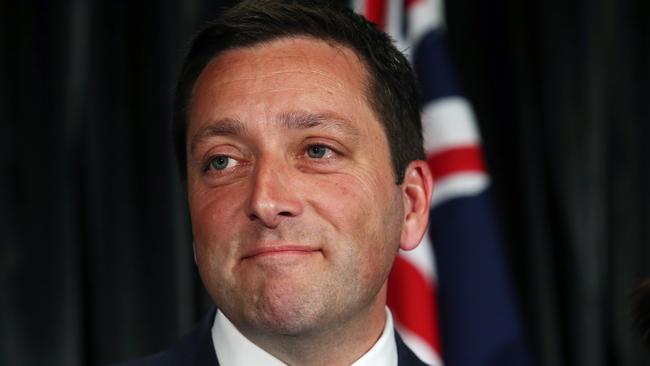
Liberal elder Tony Nutt has handed down a scathing review of the party’s 2018 election campaign, outlining a laundry list of woes including financial struggles, the federal leadership spill, inadequate screening of candidates, factionalism, and a poorly prepared campaign platform which failed to cut through in the face of a superior strategy from Premier Daniel Andrews and Labor.
Opposition Leader Michael O’Brien has welcomed the review’s findings and vowed to act on them, but several other senior Liberal figures have hit out at the absence in 120-page report of an examination of the Baillieu-Napthine government’s lack of significant achievements, which they believe allowed Labor to campaign on “getting things done”.
Mr Nutt served as Principal Private Secretary to Ted Baillieu when he was Premier from 2010 to 2013.
“I couldn’t believe that the poor performance of the Baillieu government wasn’t mentioned as a key reason for the defeat,” said one senior Liberal figure.
“Labor's platform of 'getting things done' is designed to remind voters of what the Liberals didn’t do the last time they were in.”
Another senior Liberal defended Mr Nutt, saying he had largely adopted Howard government minister David Kemp’s 2015 recommendations in Dr Kemp’s review of the 2014 election loss, which went to many of the failures of the Baillieu-Napthine government.
“The legacy of the previous government doesn’t explain why we went backwards in 2018,” the Liberal said.
Several senior Liberals also saw Mr Nutt’s failure to mention bullying allegations made by then Liberal MP Julia Banks against her male colleagues in the wake of the August 2018 federal leadership spill as an “omission”.
One Liberal said the allegations had a significant effect in deterring female voters from backing the Liberal Party, particularly around Ms Banks’s former seat of Chisholm, which includes the state seats of Burwood and Box Hill, both of which were gained by Labor.
READ MORE: Guy faces anti-corruption probe | Vic Liberal post-mortem highlights crime bust | Frost blankets Liberals | Libs eye thief’s super | Politics and purse strings |
O’Brien welcomes report
Mr O’Brien welcomed the Nutt review, noting that there has been “a lot of turnover” in the Liberal Party in the 12 months since the 2018 election.
Mr O’Brien has replaced Matthew Guy as opposition leader, while former attorney-general Robert Clark, who lost his seat of Box Hill in 2018, has taken over from Michael Kroger as state president.
The position of state director has been a revolving door, with respected veteran Simon Frost taking over from Nick Demiris as acting state director ahead of the May federal poll, Adam Wojtonis filling in after Mr Frost returned to his role as senior adviser to Treasurer Josh Frydenberg, and former Tasmanian state director Sam McQuestin beginning as permanent state director this week.
“I’ve got a very good working relationship with Robert Clark as party president, I’ve got a very good working relationship with the state director, and we are about focusing on the needs of Victorians, and what Victoria needs going forward,” Mr O’Brien said.
“We’re not going to engage in further contemplation of what went wrong in the past, other than to say we acknowledge the hard work that Mr Nutt has done, it’s a very comprehensive report.
“We will obviously take his recommendations on board, and many of them have already been implemented.”
Asked what he would do to ensure Victorians know who he is, in light of the report’s finding that 17 per cent of voters had not heard of Mr Guy, Mr O’Brien pointed to his current “listening tour” of public meetings with voters.
He also blamed the dispute between Mr Kroger and the Cormack Foundation for the party’s inability to run ads introducing Mr Guy to Victorians earlier in the campaign, but refused to name Mr Kroger or the Cormack Foundation members and said Mr Nutt has been right not to name names.
“It would have been far better for Matthew, for us as a party, if we’d been able to perhaps run some paid communications to introduce him to the public a bit earlier in the actual campaign,” Mr O’Brien said.
“Now that wasn’t possible because of the dispute with the Cormack Foundation and the financial hole that that lent to our campaigning abilities, and the money that did come in from Cormack, which was very welcome, came in very, very late in the piece.
“What I would say is that we are working very hard to make sure that we’ve got a strong relationship with all of the people who want to see a Liberal government, and O’Brien Liberal government in 2022, and we want to make sure that we start getting information, ideas, policies and information about the team and its leader out there before we get to the election year.”
‘Lobster with a mobster’
The review largely spares then opposition leader Matthew Guy from personal blame, strongly hinting that the “lobster with a mobster” hit on Mr Guy was an inside job.
Mr Nutt found that Mr Andrews had positioned his government and the Coalition “effectively enough” over his first term “on matters of direct relevance to key voters in the seats required” to win the 2018 election.
“In the minds of key voters in early 2018 Matthew Guy and the Victorian Liberals were a largely unknown quantity and remained so for too many electors through to Election Day,” Mr Nutt found.
He found that instead the perception surrounding Mr Guy that impacted most on key voters was “largely negative”, and focused on Labor’s preferred narrative of Mr Guy’s infamous “lobster with a mobster dinner” with Mafia figure Tony Madafferi and controversial decisions he made as planning minister.
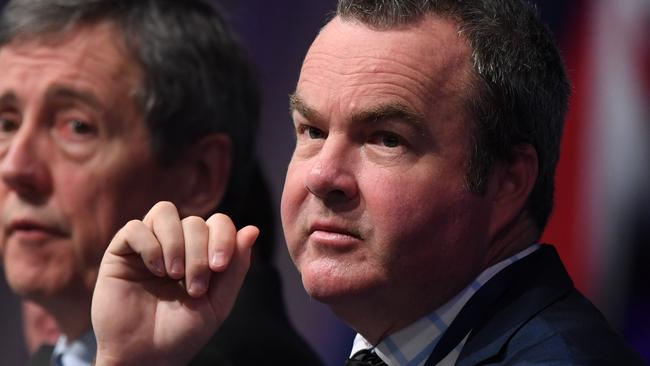
“Those responsible for the ‘Lobster Gate’ dinner carry a heavy burden for the enormous damage done to Matthew Guy and the opposition team,” Mr Nutt found.
“Leaving aside the particular details of how the dinner came about or how one specific guest was included (in all of which Matthew Guy was innocent of any wrongdoing), some others were guilty of utter stupidity, to say nothing else, given what was already on the public record.
“The subsequent widespread publicising of certain details not only affected the then leader but did the whole Liberal team huge harm as it was used repeatedly and effectively to undermine him, obscure genuine concerns about community safety and protect Labor from parliamentary scrutiny.”
Damien Mantach & the Cormack Foundation
On the financial front, Nutt notes former state director Damien Mantach’s fraud involving at least $1.56 million stolen from the party over several years, saying it had cost the party time and resources.
Mr Nutt also makes reference to an internal dispute over money raised by associated entity the Cormack Foundation, finding “various matters of financial administration became increasingly serious friction points within the party and with others including the Cormack Foundation,” which resulted in Federal Court litigation in March 2018.
“The deterioration in the relationship meant that annual funding to support party activities which had traditionally been between $1m and $1.8m over the last decade was imperilled and ceased in 2017 and 2018,” Mr Nutt found.
“The party had to make various arrangements to sustain its ongoing activities.”
Mr Nutt said the litigation, pursued by then Victorian Liberal President Michael Kroger, cost the party $1.1m and the Cormack Foundation about $1.4m.
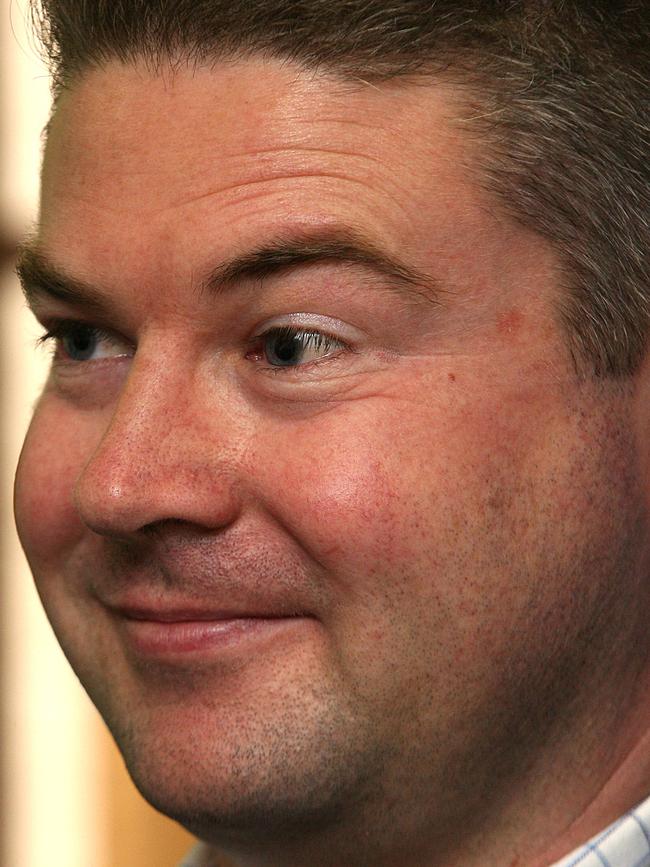
“Following the litigation and the subsequent discussion on the distribution of income the Party received $2.5m from the foundation for the state election,” Mr Nutt found.
“It should be noted, that these funds were received after the election campaign had begun and thus had to be spent as additional moneys, meaning that until there was certainty about their availability, moneys could not be pre-committed pre-election.”
“This also meant that the funds concerned could not be spent as efficiently as they might have been had there been earlier payment.”
Mr Nutt found the party’s overall finances in October 2019 were stable, but will require substantial ongoing fundraising ahead of the next state and federal elections.
He said the sale of the party’s headquarters at 104 Exhibition Street, overseen by Mr Kroger, had left it in a position to place more than $30m in long term capital investments, and potentially discharge approximately $4m in existing debt.
“The current debt came about from a combination of factors relating to the fraud, higher than budgeted expenditure in past years, loss of annual funding, cost of litigation and associated matters,” Mr Nutt found.
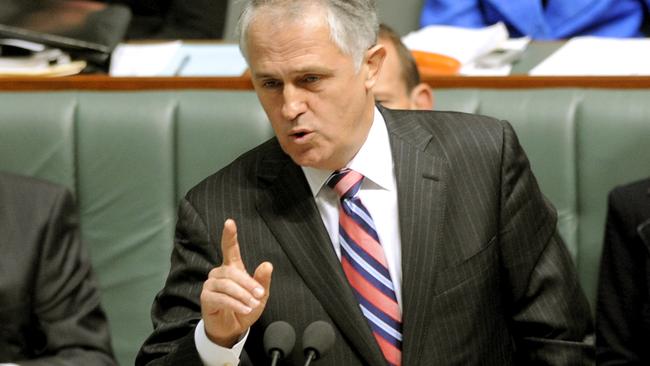
He warned that the relationship between the Liberal Party and the Cormack Foundation needed to be rectified and preserved.
“Whatever the rights and the wrongs of past matters, maintenance of an effective relationship between the organisation and the foundation is important,” Mr Nutt found.
Federal woes and leadership spills hit home
Mr Nutt found Canberra leadership spills in both 2015 and 2018 did state and territory divisions, including Victoria, no favours.
“Periods of leadership speculation inevitably effect fundraising, membership recruitment and retention and campaign preparations,” he said of Malcolm Turnbull’s ousting of Tony Abbott in 2015, and Mr Turnbull’s own departure in 2018.
He said it was easy to forget the impact of the 2018 leadership spill on the state election following Scott Morrison’s return as Prime Minister and a strong result in Victoria in 2019.
“The market research evidence demonstrates that in the context of the November 2018 state election federal leadership turmoil was an important factor,” Mr Nutt found.
“There were those who liked and supported Malcolm Turnbull in a state where he had enjoyed good levels of support – those who were appalled at what they saw as political turmoil driven by personalities and ambitions distracted from the issues facing voters and those who had no or only a limited initial ‘fix on’ the new prime minister.
“This combination of factors (largely overcome by the time of the May 2019 federal election) was ‘red hot’ in the run up to the 2018 November State election.
“The party’s campaign tracking showed that the low point of the state Liberal primary vote in 2018 was recorded shortly after the replacement of Malcolm Turnbull in August 2018.
“The ‘send a message’ sentiment was strong and clearly impacted the vote in Liberal seats lost to Labor such as Hawthorn, Box Hill, Burwood, Mount Waverley, Bayswater and Ringwood … Bass, Nepean and South Barwon as well as in seats retained but with sharp swings such as Brighton.
“In its post-election research 30 per cent of voters in Victorian electorates that were lost to Labor on the 24th November stated that they could not vote for the Liberal Party because of the removal of Malcolm Turnbull and 17 per cent of traditional Liberal voters agreed with that position.”
Candidate vetting
Mr Nutt recommended an overhaul of the candidate vetting process, saying candidates need to be “credible figures” in the minds of voters.
He said “electorally embarrassing candidates” who the party had been forced to replace in the recent state and federal elections had undermined voter confidence in the Liberal Party’s capacity to “govern sensibly in the community’s interests”, disrupted campaigns, wasted valuable time, effort and money, compromised leaders’ capacity to get out key messages, demotivated hardworking and effective candidates, and had a negative impact on the morale of donors, supporters and campaign workers.
“The party needs to seriously reform its processes for candidate recruitment, assessment, education and training,” Mr Nutt found.
“Regrettably, far more robust vetting procedures are required than are currently provided for in the constitution of the Victorian division.”
Mr Nutt recommended the party establish a new prospective parliamentary candidate screening process to ensure anyone wishing to run for preselection is “job ready”.
“This would require active co-operation with professional vetting services (supervised by the State Director) using modern technology to identify any potential problems,” he found.
“Failure to facilitate screening would disqualify an applicant from consideration.”
Factionalism
Mr Nutt found “every word” of a passage criticising factionalism within the Victorian Liberal Party in a 2002 state election review remained relevant almost two decades later.
“The immediate challenge confronting the Liberal Party in Victoria is to focus on Labor as the real enemy, and not become bogged down in an ongoing state of internal warfare,” the 2002 review found.
“Neither party members nor the general public are remotely interested in watching senior party figures fight over the spoils of opposition.
“There are plenty of real battles to be fought on the public stage over important policy issues.”
Focus on Labor scandals, law and order, cost of living
Mr Nutt found the Coalition’s focus on Labor scandals, wastage of taxpayers’ money, issues such as the East West Link and CFA, and campaigns on law and order and cost of living had not cut through to key voters in the face of a superior, infrastructure-focused pitch from Labor.
“All these examples cited above were prominent at various points — the CFA and union power for instance remains an issue today, but Labor were nonetheless largely successful in riding out problems through superior issue management, rolling out new initiatives and changing the subject,” Mr Nutt found.
“Key seat voters might be very unimpressed by the Red Shirts affair for instance but the brutal reality was that it was not going to change their actual vote on polling day given more relevant, personal and compelling factors like delivery of local infrastructure.”
He found that while the Liberal Party’s i360 polling and feedback from MPs and candidates had highlighted law and order as a key issue for voters, post-election market research found only 6 per cent of voters said it had influenced their votes, and not necessarily to the Coalition’s advantage.
“Of course 69 per cent agreed that Labor should follow the general “tough” stance on ‘law and order’ of the Liberal Party but as successive ‘learnings’ from state elections demonstrate headline figures expressing concern or embracing statements that crime is an important issue are an insufficient strategic basis,” Mr Nutt found.
“It did not drive much actual voting behaviour because ‘soft voters’ didn’t feel unsafe and were focused on other matters.
“Further the focus on ‘African gangs’ became a distraction for some key voters who saw it as a political tactic rather than an authentic problem to be solved by initiatives that would help make their neighbourhoods safer.
“To be successful in Victorian State elections ‘law and order’ initiatives must be based on, (a) a genuine problem perceived to be relevant to soft voters (who feel a “personal proximity of a threat”), (b) be addressed with a proportionate and substantive policy solution, and (c) not be perceived by relevant voters as a ‘cheap political tactic’.”
Mr Nutt found that while the Coalition’s ‘Get Back in Control” campaign on cost of living was built on some genuine and substantive community concerns, its impact on key seat voters was limited by its emergence in their minds as “late” in the election.
“The positive initiatives to demonstrate the Coalition’s practical solutions seemed to many key seat voters as poorly thought through stunts,” Mr Nutt found.
“This undermined their credibility and reinforced an existing view that after only one term in opposition the Coalition was simply unready to return to office.”
What Andrews got right
Mr Nutt found Labor had dominated the political agenda and defined themselves and their policies over the four years of their first term.
“In key voters’ minds they had a coherent plan,” Mr Nutt found.
“Throughout its term Labor used all its resources of government to promote its narrative, policies, program and personnel, and Andrews and his government were largely effective in marginalising dissent and sidelining criticism.”
Failure of i360 polling system
Mr Nutt found the Coalition missed a crucial opportunity to capitalise on the high cost of living, low job security and high housing prices.
He found that strategy was not adopted by key decision-makers in the party, in part because they were mislead by telephone and doorknock data obtained through the i360 polling system.
“While those concerned had confidence in this process it was deeply flawed,” Mr Nutt found.
“Critical decisions on strategy messaging and communications and guidance provided to external service providers was flawed.”
‘Flawed’ tactics
Mr Nutt found tactical decisions on resources for individual seats, leader activity, messaging, mail, and social media “were also flawed”.
“Instructions (variously described as coming from CHQ or the Leader’s office or senior parliamentarians) to Liberal MPs in marginal seats, who should have been making maximum efforts locally pre campaign and during the election to hold their seats to move money, campaign workers and their own activities to ‘target’ Labor seats because ‘we have already won your seat’ and ‘we need to reinforce a winning position in targeted Labor seats’ were simply wrong.
“Given the obvious impact on voters in many of our marginal seats following the August federal leadership change it is unclear why our MPs were not being told to ramp up defensive activity.
“As noted above the only logical conclusion is that campaign decision makers were persuaded that the electoral position was more benign.
“Given the overall position in the campaign Labor was likely to win seats, but had there been much more effort in our key marginals both before and during the campaign seats would have been saved.”
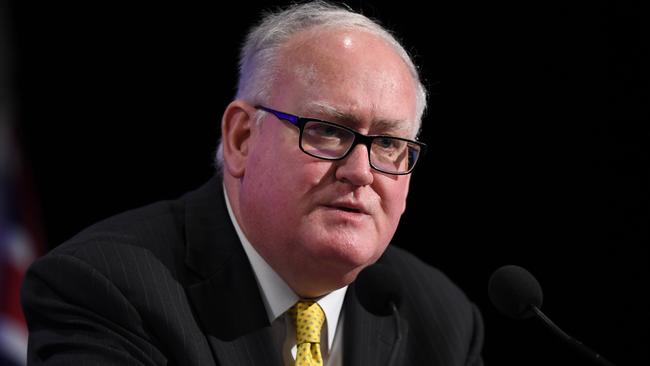




To join the conversation, please log in. Don't have an account? Register
Join the conversation, you are commenting as Logout